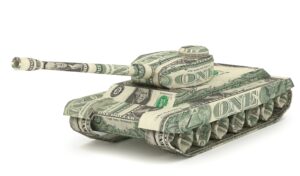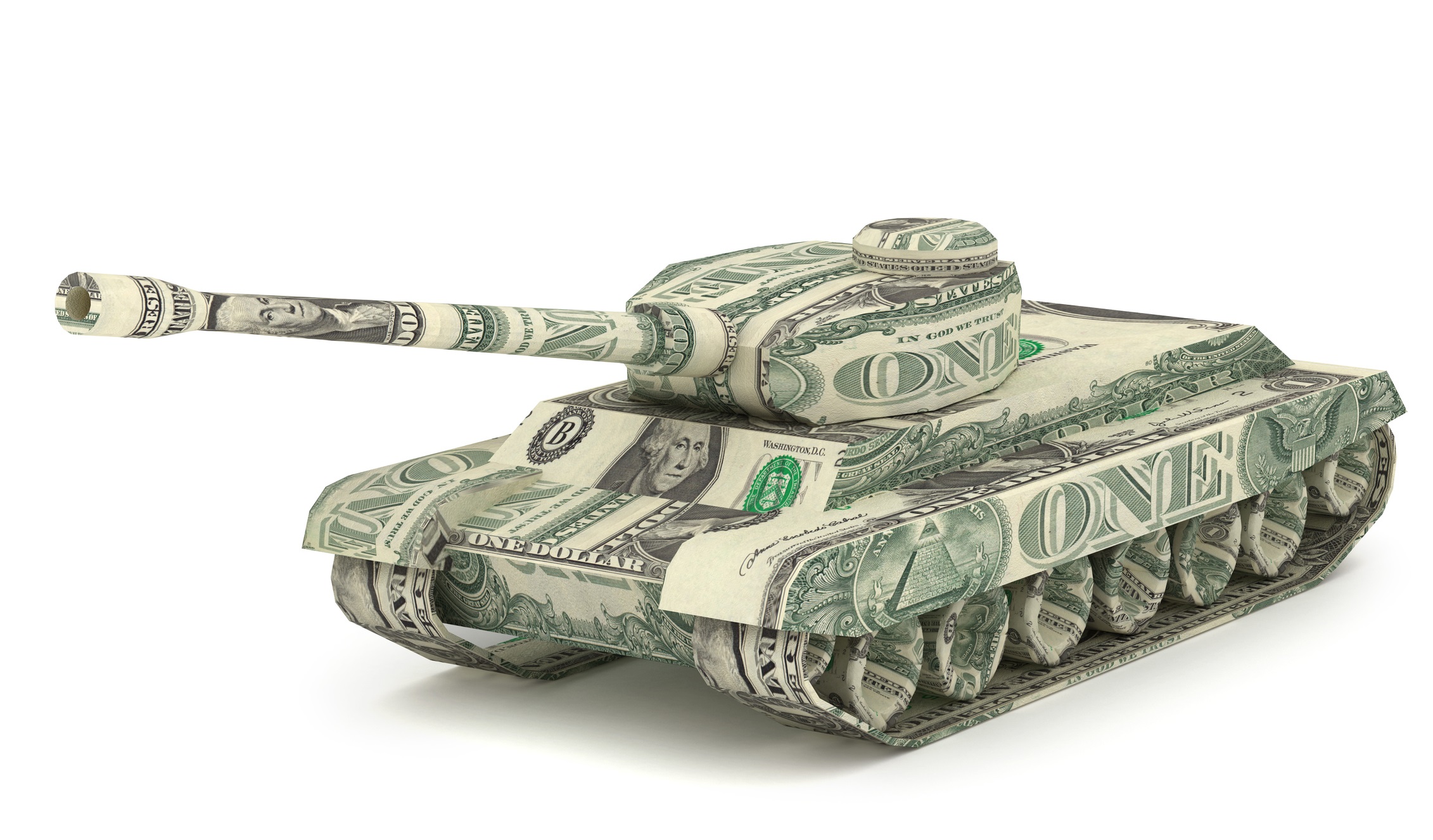
Those who make money on wars are unlikely to be on Forbes’ richest list. Their money is real but elusive to an observer’s eye. Most of us will feel the pain of paying for that war.
Congress is midway through approving the next chunk of funds for the Ukrainian cause. With a lot of yelling and screaming several days ago, the U.S. Senate approved the funding. The House is more divided on this issue, so the outcome of the arm-twisting expected next week is still uncertain. The media bombard the public with conflicting messages. Who lies, who tells the truth?
Before touching on arguments for and against, it is worth examining how money factors into the war business.
War is the best business possible, but not for those on the front lines
When the foundations of the modern financial system began shaping in the 18th century, the rich realized that lending money to governments, at that time often kings or local rulers, was much more profitable than lending to individuals. Nothing has changed since then.
Earning interest on money lent to individuals is risky and troublesome. A million things may happen, making a person insolvent. Collecting debt can be costly. Also, to make meaningful money, one needs to manage many transactions. It is hard to avoid mistakes.
Lending money to governments is the financiers’ dream. The nation’s economy serves as collateral. Even if the rulers change, the new ones need money as well. So, people are taxed to pay both the previous and new loans.
In old times, kings needed money for wars. Usually in a hurry and in quantity. It is the best way for lenders to earn high profits. Financing a war is bad for publicity, so no one brags about it. Historians digging into old records are gaining insight into who paid for wars fought in the 1800s and how. There are publications about money flows during World Wars I and II. Still, there are more assumptions and speculations than verifiable facts.
After the shock of atrocities committed during WWII, worldwide public opinion was for forming an international order preventing wars. It seemed to work to some degree. Once aggressors, Germany and Japan joined the peaceful community of nations. Despite a few sparks, the Cold War never turned hot. Those were proof that peaceful coexistence of nations is possible.
It also means that international financiers did not make big money on wars that did not happen. We had many regional conflicts, but none was on a scale that would be a decisive factor in reshaping the economies of the wealthiest nations. Financiers benefited from the lengthy wars in Iraq and Afghanistan. The U.S. lost around $2 trillion or about $6,000 per every living soul in America. But those wars ended.
Can the conflict in Ukraine end without spending money?
That ship has already sailed. Whether Americans like it or not, they are already in it. The objective is to end that conflict on the lowest budget possible.
The war in Ukraine is a blessing for big-money folks. With the superpowers involved, it can potentially become the biggest money-making bonanza since WWII. The stakes are high. Much money goes into getting public support for this or that option. It is easy to get confused.
The longer this conflict festers, the more it will cost us. Americans and the West, in general, are in a disadvantageous position because they misread Putin.
The first warning sign came during the war in Georgia in 2008, when Russia leveraged its superpower position to annex a part of a neighboring country. In the big picture, it was a marginal issue. In legal terms, Russia violated the rules it was statutorily obligated to maintain as a permanent member of the United Nations Security Council. There was a lot of talk but no formal action at the U.N.
In the view of Putin – shared by many Russians – Ukraine and Belarus are a part of greater Russia. After Ukraine and Belarus gained independence, Russia tried to arrange close ties with both nations. It did not work well with Ukraine, especially under Putin, with his inglorious Soviet past and totalitarian inclinations. Ukrainians aspire to build a modern democratic nation. They envy neighboring Poland, which is prospering after joining the European Union, and want the same.
In 2013, Russia blocked Ukraine’s attempt to get economically closer to the E.U. Riots broke out in Kyiv. In retribution, Russia occupied Crimea and started fomenting rebellion in Donbas. Again, there was a lot of talking but no diplomatic action, like suspending Russia’s position at the U.N.
Putin can talk at length about Russia’s historical rights or obligations to ethnic Russians living outside of Russia. For example, in Crimea, Russians are the majority. From a historical perspective, Russia’s claim to Crimea could be as good as Ukraine’s. Therefore, Putin could have chosen a legal, diplomatic path to regain Crimea. Instead, he went with a covert military operation, followed by a questionable referendum. Why? Tucker Carlson did not ask about that when he had a chance.
It is an American war now
The primary problem that the United States is facing today in Ukraine is a rogue ruler of a superpower, blatantly disobeying international rules, which, as a permanent member of the U.N. Security Council, Russia should help to maintain. The fate of Ukrainians and their nation is an associated moral issue. And the legal obligation arising from the Budapest Memorandum.
On the evening of February 23, 2022, the U.N. Security Council met to prevent Russia’s invasion of Ukraine. As the discussion was boring, I switched to a Russian TV channel from Moscow. It was already early morning over there, and I saw Putin telling the world that the invasion had just started. For Westerners, it might look like a coincidence. For someone who understands the mentality of people from the region, it was more than evident that Putin gave the finger to the United Nations and the West.
Everyone could see that, but the money people paid attention. They saw the potential for milking the wealthy nations in the West for years. So, instead of declaring Putin a war criminal on the morning of February 24, 2022, we heard cautious politicians and pundits advising us not to annoy Putin.
Western military experts expected that Russians would take control of Kyiv within a few days. The money folks did not worry. They knew that enough Ukrainians would be fighting even if that happened. With the size of Ukraine, Russia would need decades to get any reasonable control of it. Whatever Ukrainian territory Russia can hold, it would become as hopeless as Donbas had been after 2014. The more infrastructure is destroyed, the more money will be needed for rebuilding after the war. Ukraine is potentially rich; Ukrainians are good workers; they will pay.
For Ukrainians and Americans, the preferable outcome would have been a decisive defeat of Russia in the first weeks of the war. Russians had a decisive advantage in the air force. Ukrainians asked for air support. It was risky because it would require NATO to shoot down Russian rockets and airplanes above Ukraine. But legally, it was for Ukrainians to decide who could fly in their airspace. No one was bold enough to tell Putin that and act on it.
Later, an option for Ukraine to get old Soviet planes from Poland and others was suggested. Americans blocked it, and it took many months to reverse it. In the meantime, Russia had time to bring in more soldiers and manufacture more equipment after the first failures.
Western aid for Ukraine is a series of delays. Whatever weapons Ukraine asked for were always delivered like mustard after dinner. It could happen once or twice, but it is logical to ask who loses and who benefits when it becomes a pattern. It seems like an elusive hand intentionally prolongs the conflict.
Currently, the opponents of the extended help to Ukraine claim that they want to end the war and save American taxpayers money. Coincidentally, it plays into the interests of financiers.
Big-money people do their due diligence. They know that if Russia wins decisively in Ukraine, it will face underground resistance lasting for many years. There would be a massive exodus from Ukraine, distorting the peaceful lives of people in Europe. Russia will be ostracized; ergo, both Russia and Ukraine will be out of reach for business. People with big money would be losing. So they have no interest in Russia winning.
They also see that, for Putin, Ukraine is a stepping stone in giving Russia the dominant superpower position worldwide. It can happen only by weakening the United States. In his interview with Tucker Carlson, Putin indirectly said that when comparing the U.S. to the Roman Empire. He implied that the greatness of the U.S. is ending.
One can suspect that the Hamas attack on October 7 has Putin’s fingerprints on it and emboldened Iran in its opposition to the U.S.
Lastly, the economic cooperation group BRICS aims to form an international financial system as an alternative to the current dominant one among the Western nations. Russia’s win in Ukraine would strengthen BRICS. The Western financiers do not want that to happen.
For big-money interests, the best option is Russia’s loss after the prolonged war. Russia is too big and has too many natural resources to be left outside the worldwide economy. Under Putin’s rule, Russian oligarchs enriched themselves, deposited their money in Western banks, and bought their villas and yachts there. But, under Putin’s tight control, international businesses had limited access to Russia.
From the banker’s perspective, a defeated Russia will be forced to accept the winner’s terms, similar to what happened to Germany and Japan after WWII. Russia and Ukraine will get a version of the Marshall Plan. Good for bankers.
A decisive military help for Ukraine can boost the morale of the Ukrainians and can be a debilitating factor for Russia. At the beginning of the war, there was a moment when it could have worked. Russia entered the war with many miscalculations. Deeply disadvantaged, Ukraine had a few spectacular successes.
Two years later, the war is in a stalemate. Both sides think that they can win. People financing that war cannot complain. They see Russia’s unconditional surrender as the outcome, but in the meantime, they see profits in prolonging the war for an additional year or two, maybe even longer. One can conclude that from the voices now opposing the funding for Ukraine.

 Many tell us what to think. I ask my readers to be skeptical. Question me and others.
Many tell us what to think. I ask my readers to be skeptical. Question me and others. 
